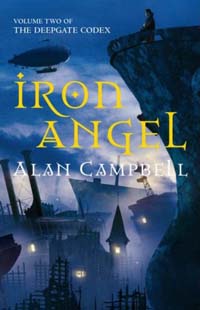By Alan Campbell

It wasn’t long ago that I posted a review of Scar Night, the first of Alan Campbell’s Deepgate Codex, and I remember being totally bowled over by a book that was dark, complex and hugely imaginative. Iron Angel, thankfully, continues in exactly that vain.
Central to the story is the historic war between the Gods, when Iril and his sons unsuccessfully rebelled against the Goddess Ayen and, in the aftermath, the gates of heaven were sealed shut, Iril was cast into hell and his sons imprisoned on earth. Iron Angel opens with the outcast sons again plotting against Ayen, enlisting the help of second-oldest son, Cospinol, God of Brine and Fog, to seal a breach in the portal to hell (caused by events in Scar Night) and stop would-be King Menoa’s Mesmerist forces from escaping and taking over the world. Meanwhile, they can concentrate on deploying their own forces in Pandemeria where Menoa himself is gathering an enormous army to attack the First Citadel and crush the remaining Gods for good. Cospinol’s reward, should he succeed, will be the capture of the angel, Carnival, whose soul holds the key to his freedom.
We pick up part one the story with the hapless Archon, Dill, and his erstwhile protector, ex-Spine assassin, Rachel, hiding out in the Deadsands with the remaining armies of Deepgate and the whole of the Spine – whose power now seems absolute – looking for them as suitable scapegoats for what happened to the city. Inevitably they are captured and, when Rachel effects an escape, the body of the Dill she brings with her no longer contains his soul, and the soul that now possesses him is determined to reach the First Citadel and warn of the coming attack, giving her no option but to help, so that she can return the body to its rightful owner. The second part of this triptych concerns John Anchor, a giant of a man, tasked with hauling Cospinol’s ship across the skies and collecting souls for him. With no concept of “cannot” John’s only concern is to reach Deepgate, close the breach and find Carnival to free his master. The third part takes place in Hell and concerns King Menoa and his ongoing battle for possession of Dill’s soul with the God, Hasp, youngest of Ayen’s seven sons and Lord of the First Citadel.
While the mythology is fascinating, the most compelling part of this book, like its predecessor, is discovering the world that Campbell has built to play out his epic saga. The city of Deepgate gets left behind as we sweep across the fantasy landscape of the Deadsands with riders on horses weilding swords and bows and arrows, discovering along the way the incredible Cinderbark Wood – where years of Deepgates poisoners practicing their craft has left every branch, thorn and twig secreting toxins that will kill any creature that touches them in seconds, into Pandemeria, where the power of captured souls fuels the technology of this steampunk world, and finally through Hell, the Maze, a place built with souls, used to make walls, doors and windows as well as weapons and where control of your soul means control of your environment. But souls will try to escape, and hell employs a great many creatures – Icarates, Iolites, the Legion of the Blind – to keep them in place, ready for use.
But here is where I start to contradict myself. Should the most fascinating part of the story be the world it takes place in? Yes it’s rich and dark and complex and utterly compelling but shouldn’t those accolades go to the characters? There is definitely way more plot here than in the first book and the author has moved on considerably from his debut. The scale is epic and the action huge, big on gore, and visual in ways that a lot of cinema fails to achieve but unfortunately I couldn’t care less whether any of the characters lived or died. It’s partly because they’re not very well drawn; there are lots of them, each gets a cursory introduction and we learn little of them as the story unfolds, but the biggest reason is that, on the whole, they are selfish, self-centered and, driven only by fear or greed, almost completely lacking in redeeming qualities. It’s the only glitch in an otherwise impressive second showing but it’s a big one.
However, I find myself liking Iron Angel despite these misgivings. Campbell has taken all of the aspects that made Scar Night so compelling and expanded and enhanced them into a book that, while not without faults, is utterly engaging and tremendously readable and I’ll forgive him most things if the third book in the Deepgate Codex turns out to be as riveting as this one.
Iron Angel is published by Tor through Pan Macmillan and is available from Amazon, Blackwell and all good book stores.
